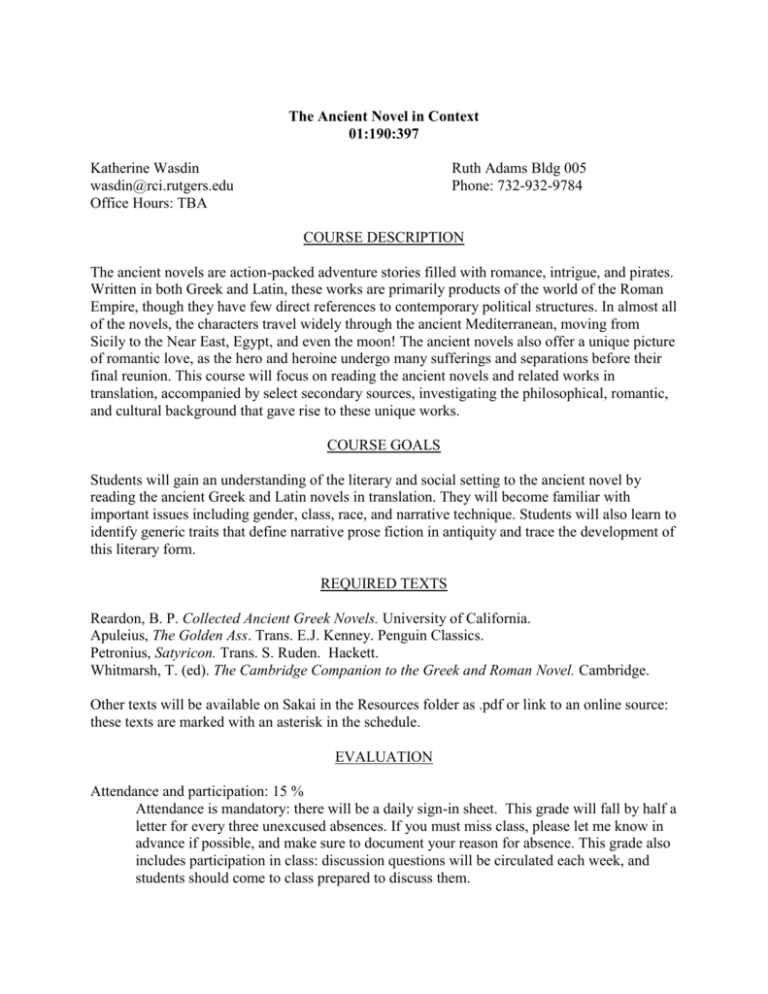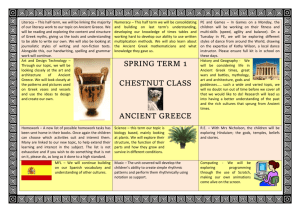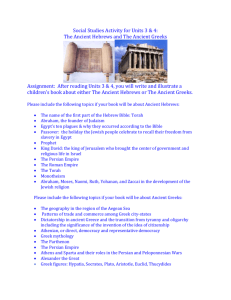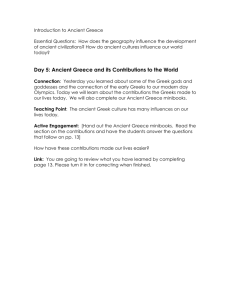
The Ancient Novel in Context
01:190:397
Katherine Wasdin
wasdin@rci.rutgers.edu
Office Hours: TBA
Ruth Adams Bldg 005
Phone: 732-932-9784
COURSE DESCRIPTION
The ancient novels are action-packed adventure stories filled with romance, intrigue, and pirates.
Written in both Greek and Latin, these works are primarily products of the world of the Roman
Empire, though they have few direct references to contemporary political structures. In almost all
of the novels, the characters travel widely through the ancient Mediterranean, moving from
Sicily to the Near East, Egypt, and even the moon! The ancient novels also offer a unique picture
of romantic love, as the hero and heroine undergo many sufferings and separations before their
final reunion. This course will focus on reading the ancient novels and related works in
translation, accompanied by select secondary sources, investigating the philosophical, romantic,
and cultural background that gave rise to these unique works.
COURSE GOALS
Students will gain an understanding of the literary and social setting to the ancient novel by
reading the ancient Greek and Latin novels in translation. They will become familiar with
important issues including gender, class, race, and narrative technique. Students will also learn to
identify generic traits that define narrative prose fiction in antiquity and trace the development of
this literary form.
REQUIRED TEXTS
Reardon, B. P. Collected Ancient Greek Novels. University of California.
Apuleius, The Golden Ass. Trans. E.J. Kenney. Penguin Classics.
Petronius, Satyricon. Trans. S. Ruden. Hackett.
Whitmarsh, T. (ed). The Cambridge Companion to the Greek and Roman Novel. Cambridge.
Other texts will be available on Sakai in the Resources folder as .pdf or link to an online source:
these texts are marked with an asterisk in the schedule.
EVALUATION
Attendance and participation: 15 %
Attendance is mandatory: there will be a daily sign-in sheet. This grade will fall by half a
letter for every three unexcused absences. If you must miss class, please let me know in
advance if possible, and make sure to document your reason for absence. This grade also
includes participation in class: discussion questions will be circulated each week, and
students should come to class prepared to discuss them.
Weekly quizzes: 10 %
There will be a brief quiz each week over the primary reading (i.e. the novels, not the
Companion chapters). The lowest quiz grade will be dropped.
Written assignments: 30 %
Each student will also write two essays (c. 2 pages each). I will accept drafts for revision
up to a week before the final due date.
Midterm: 20 %
The midterm will consist of three sections: Short answers on basic factual information;
identification and brief discussion of passages; and an essay section.
Final: 25 %
The final will have the same format as the midterm, but will be longer. The final will be
comprehensive.
PROVISIONAL SCHEDULE
Week 1: Introduction to the ancient novel and its historical and geographical background
Reading: Ch. 1 Companion; Selections from Herodotus’ Histories and Xenophon’s
Cyropaedia*
Week 2: Travel and History
Reading: Chariton, Chaereas and Callirhoe (Reardon 17-124)
Ch. 7 Companion
Week 3: Generic markers and Standards
Reading: Xenophon of Ephesus, Ephesian Tale (Reardon 125-169)
Ch. 2 Companion
Week 4: Erotic Philosophy I (Greek)
Reading: Achilles Tatius, Leucippe and Clitophon (Reardon 170-284)
Ch. 3 Companion
Week 5: Narrative technique
Reading: Heliodorus, Aethiopica 1-5 (Reardon 353-472)
First Essay due
Week 6: Egypt and Ethiopia
Reading: Heliodorus, Aethiopica 6-10 (Reardon 472-588)
Ch. 14 Companion
Week 7: Country vs. city on a Greek island
Reading: Longus, Daphnis and Chloe (Reardon 285-348)
Midterm
Week 8: Fragments of Greek novels: Fantasy and Utopia
Reading: Fragments from Reardon (775-827) and Sakai*
Ch. 11 Companion
Week 9: Italian adventures and social commentary
Reading: Petronius, Satyricon
Ch. 5 Companion
Week 10: Erotic Philosophy II (Latin)
Reading: Apuleius, The Golden Ass 1-6
Ch. 6 Companion
Week 11: Inspiration and sources
Reading: Apuleius, The Golden Ass 7-11; Ps.Lucian, The Ass (Reardon 589-618)
Second Essay Due
Week 12: Philosophical heroes and tall tales
Apollonius of Tyre (Reardon 736-772); Lucian, True Story (Reardon 619-649)
Ch. 15 Companion
Week 13: Historical Fiction
Ps. Callisthenes, The Alexander Romance (Reardon 650-735)
Ch. 4 Companion
Week 14: Generic Definitions and Final thoughts
Ch. 16 and 18 Companion
Bibliography for further reading
Anderson, G. Ancient Fiction: the Novel in the Graeco-Roman World. (London 1984).
Bartsch, S., Decoding the Ancient Novel: The Reader and the role of Description in
Heliodorus and Achilles Tatius. (Princeton 1989).
Hägg, T. The Novel in Antiquity. (Oxford 1983).
Konstan D. Sexual Symmetry: Love in the Ancient Novel and Related Genres. (Princeton 1994).
Morgan, J. R. Stoneman, R., (eds.) Greek Fiction: Tthe Greek Novel in Context. (London 1994).
Schmeling, G. (ed.) The Novel in the Ancient World (Leiden: Brill, 1996)
Stephens, S., Winkler, J., (eds.) Ancient Greek Novels: the Fragments. Introduction, Text,
Translation and Commentary. (Princeton 1995).
Swain, Simon (ed.) Oxford readings in the Greek novel. (Oxford 1999).
Tatum, J. (ed.)The Search for the Ancient Novel. (Baltimore 1994).










